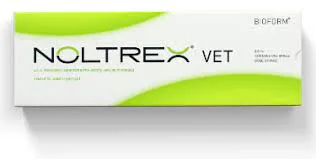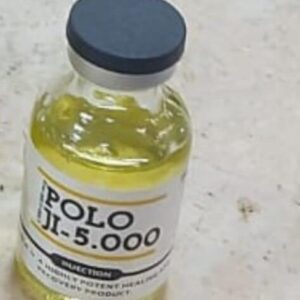Noltrex
Dosage and administration Noltrex
Insert NOLTREX- into the joint cavity using an 18Gx1- or 21Gx1- needle compatible with the Luer-Lock- adapter. In the presence of free fluid in the joint, it is desirable to achieve the cessation of exudation and to introduce the material 48-72 hours after the elimination of the inflammatory process. Introduction to the joint without preliminary evacuation of free fluid is impractical. If there are bubbles in the gel, the syringe should be shaken upward several times before introducing the syringe,
with the bubbles moving under the piston. Enter NOLTREX- should be in the upper inversion, preferably from the outside (the patient is in a lying position). To reduce pain immediately during injection, novocaine or lidocaine anesthesia (at the doctor’s discretion) is recommend both inside the joint and directly at the injection site. When introduced into the joint cavity, the patient may feel a sense of fullness, and if accidentally introduced into the soft tissues, it may burst. Introduction into soft tissues does not lead to intraarticular or soft tissue complications, but it refers to undesirable consequences associated with a violation of the technique of administration and should be eliminate by evacuating the material from soft tissues. Due to the high density of NOLTREX-with excessive pressure and the speed of introduction,
Noltrex for horses
it is possible to extrude NOLTREX-in the opposite direction through the piston. Introduction through a 21Gx1-needle reduces pain in the injection, but requires more pressure on the plunger and an increase in injection time. The average recommended rate of administration is 3-5 minutes per injection. During the day (or more – according to indications) after the procedure, the loads on the interested joint are limite.
If necessary, NOLTREX- can be remove by puncture and washing of the joint cavity. NOLTREX-is introduce into the knee joint in an amount of 2.0 ml or more. up to 10 ml. With an interval of one week. It is permissible to administer up to 5 ml. at a time (for one procedure). Hip joint from 2 ml. Up to 5 ml. The recommended interval between injections is one week. 1) The method of administration is calculated individually depending on the stage of osteoarthritis (osteoarthritis) and at the discretion of the doctor.
Noltrex vet
2) Repeated insertion into the knee joint in a sitting position creates the possibility of damage to the cartilage of the articular surfaces and meniscus with a large diameter needle. 3) In order to avoid overfilling of the joint with a dense slowly resorbable NOLTREX- it is recommended to stop the course with a good clinical result! 4) It is advisable to repeat the courses once every 6 to 24 months. depending on clinical manifestations. 5) The scheme of a repeated course of injections can be reduced according to indications. 6) In other joints, the material is injected in 2.0 ml or less, depending on the size of the joint. 7) It is strongly recommended to introduce NOLTREX- into the hip joint under ultrasound control. Attention! The correct administration technique and selected course of treatment is a critical point for an effective result.
Side effects of NOLTREX
The most likely complications associated with periprocedure or temporary postprocedural (no more than 72 hours) pain or burning. They can be stopped with non-steroidal anti-inflammatory analgesics. Other possible side effects and complications are related to the method of administration by intra-articular injection: pain or swelling at the injection site, infection (septic or yeast arthritis, osteomyelitis, sepsis, etc.), subcutaneous neuropathies, drug-induced vascular embolism, aseptic acute arthritis, articular effusion, synovitis, fullness, burning sensation, arthralgia. Some of the complications associated with the route of administration can be avoided by strict adherence to aseptic rules and administration techniques.
Since NOLTREX does not contain animal materials, the likelihood of an allergic reaction is very low, but not excluded. But neither in clinical studies, nor during post-marketing surveillance, any allergic reactions or cases of rejection were reporte. The patient is advise to consult a doctor with persistent pain or burning sensation in the joint, redness, swelling at the injection site, changes in the joint area, a feeling of bursting or foreign body in the joint or periarticular region, signs of an allergic reaction. Adverse reactions should be reporte to the representative of LLC -NTS-BIOFORM-.
Contraindications
– inflammatory conditions of the skin in the area of the alleged administration of NOLTREX-; – articular effusion; – the introduction of NOLTREX– in an infected or inflamed joint, synovitis; – condition after arthroscopic operations (use is possible not earlier than 1 week immediately after the intervention in the absence of signs of inflammation); – diabetes is a relative contraindication – taking into account the mild tissue vulnerability to diabetes, it is necessary to carefully consider the use of NOLTREX- in this category of patients; – pregnancy and lactation (see below). – autoimmune diseases.
Interaction with other drugs
The simultaneous use of NOLTREX-with local anesthetics (novocaine, lidocaine) is possible. The effect in combination with other products or medicines has not been investigate.
Storage conditions
Store at a temperature of + 1 ° to + 30 ° C. Do not expose to sunlight, do not freeze. Keep out of the reach of children.
Structure of NOLTREX
– 3-dimensional polyacrylamide,%: 4.0 – 1.5; – purified water,%: 96.0 – 1.5; – silver ions,%: 0.0001 – 0.0025.
NOLTREX- acts by restoring the viscosity of synovial fluid in joints affected by osteoarthritis (osteoarthritis). As a result of this, the pain syndrome stops, and joint mobility improves. A feature of NOLTREX is a longer duration in comparison with pharmaceutical preparations and materials for viscometric supplementation. NOLTREX-biodegradation occurs through resorption by macrophages and non-cellular lysis. It undergoes very slow biodegradation for more than 6 months. It is excret mainly through the kidneys and liver, without damaging the tissue. NOLTREX- metabolites (using radioactive labels) are found in urine and liver. In the joint cavity, the position and orientation of the implant (NOLTREX-) are not determineby radiological methods.




Reviews
There are no reviews yet.